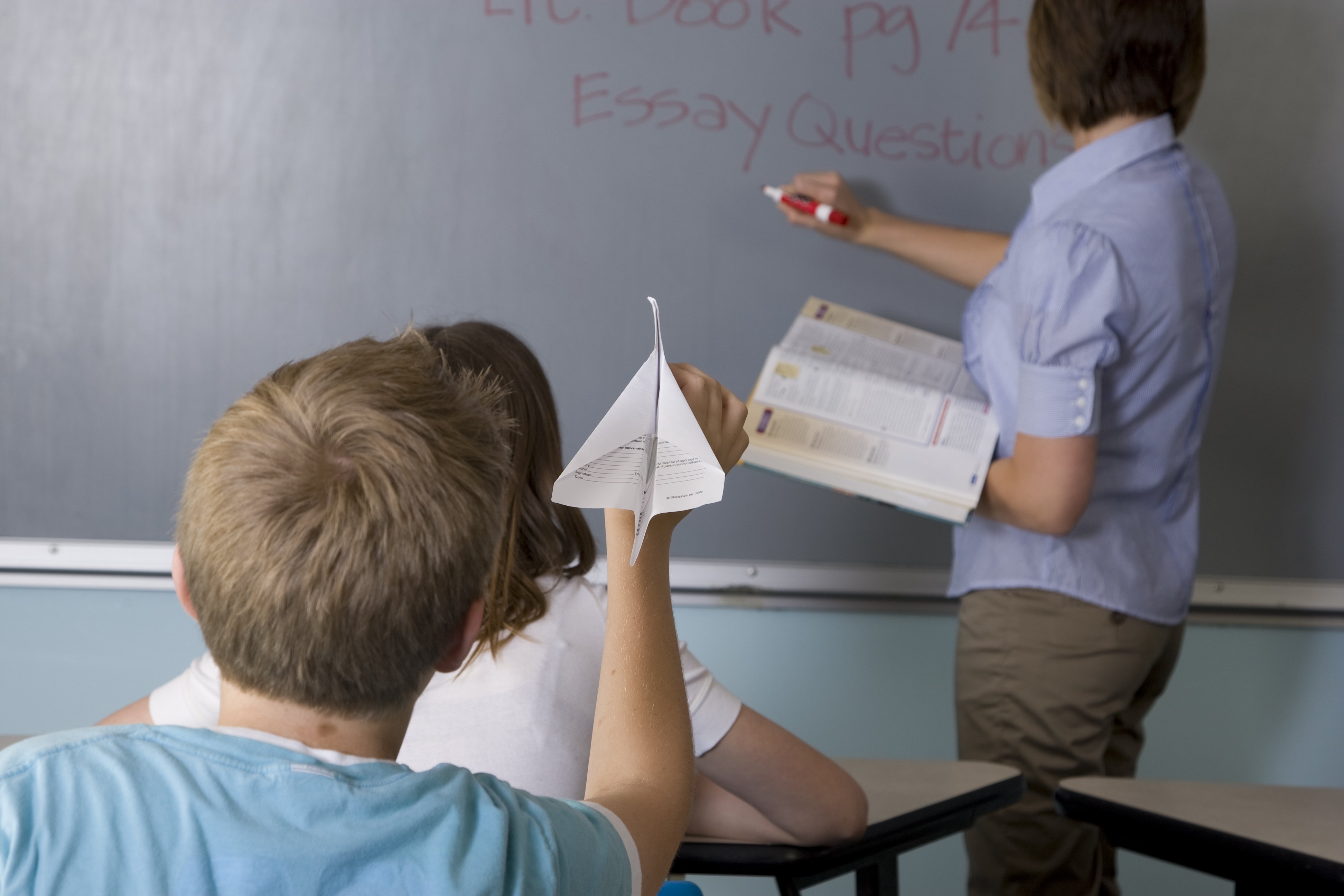The chaotic behavior of some troublemaker students in their classrooms may be one of the most pervasive of these issues. You, as a teacher and class manager, cannot ignore that behavior, especially since it affects other students in addition to the troublesome student and prevents their classmates from completing the necessary learning.
Several effective strategies can be applied to accommodate the troublemaker student and change their behavior to keep the classroom environment conducive to learning. These strategies do not require a great effort from the teacher, and some of them can be practiced while delivering the lesson and applying its activities. Others are direct attempts to get the troublemaker student to stop what they are doing immediately, but these strategies take more time from the teacher.
Whatever the case may be, it is the teacher's responsibility to intervene with a remedial method in the troublemaker student's behavior by fostering a positive relationship with them, helping them accept responsibility and understand the risks involved in their actions as well as the potential damage they could cause if they were to continue, whether in the short or long term.
Types of Class Issues Caused by the Troublemaker Student and Their Causes
A troublemaker student may cause a variety of issues, such as those that are educational or behavioral, as well as those that are either individual or group in nature and involve their colleagues. They may also engage in one or more of these issues. Class issues can be further explained by the following:
1. Educational Issues
For example, the troublemaker student fails to pay attention to the lesson, lose concentration, refuse to answer the teacher's questions, skip class discussions on science topics with their classmates, fail to complete their homework and schoolwork, fail to bring their books and notebooks to school, have poor concentration skills, perform poorly academically, and so on. The following are a few causes of these issues:
- Feeling ashamed
- Fear that giving an incorrect answer might result in punishment.
- The teacher disregards the student's differences when presenting the lesson.
- The student's psychological discomfort in the classroom and at home impacts their academic performance.
- Ignoring the student's follow-up at home.
- Mental distraction, low level of student intelligence, and poor memory.
- The student dislikes the subject or the teacher who teaches it.

2. Behavioral Issues
Such as, aggressive behavior, interrupting lessons, using exam-cheating ways, evading responsibility, lying, stealing, screaming, sabotage, rebellion, disobedience to the teacher's orders, breaking school rules, excessive aimless movement, etc. The following are a few causes of these issues:
- Show off and desire to draw attention from others, mainly if they are teenagers, as they frequently seek to establish a respectable social status, to demonstrate their abilities, or to stand out by persistently soliciting assistance in case they are lazy students.
- The student may argue, confront, or rebel to get the power they want and to assume leadership.
- Existence of a friendship between a student and a classmate where one of them actively encourages the other to interrupt class or act inappropriately.
- The desire to feel successful and special by hurting others, as their behavior is primarily characterized by envy and rage. They might be found destroying the chairs in the classroom, tearing up the books, breaking the pens of their classmates, etc.
- The student-rearing method at home, excessive pampering, or instilling bad habits like using bad language when speaking to others.
- A student's jealousy toward a classmate may drive them to try to influence that student to downplay their success.
- How other students react to the troublemaker student's behavior encourages them to repeat it whenever they feel like it is possible.
- The students attempt to voice their suppressed emotions, which they can only do by engaging in disruptive behavior.
- The lack of adaptability, as well as weariness and boredom feeling.
- The jeers they might be exposed to in class.
- Too much criticism of the student, whether from the teacher, their family, or the school administration.
- The student dislikes the teacher, or the teacher discriminates between students and is biased towards one student over others.
- The student may experience tension and frustration due to the numerous restrictions placed on them. Additionally, the teacher's hurried pace in finishing the lesson may be especially true if the student doesn't fully understand what is being explained.
- The student may engage in bad behavior like stealing because they want things that others already have. Also, they might steal out of retaliation against the teacher who favored that student over them or out of jealousy and envy for that student. Fear of punishment may also be a reason for theft behavior, as a student who misplaces their book may turn to steal one from classmates or other means out of fear of punishment.

How to Deal with Troublemakers Students?
- Encouraging students to voice their opinions whenever they want to without fear and taking care to avoid being made fun of by other students.
- The learning style must be appropriate for all students of all levels and consider individual differences when teaching the lesson.
- Not giving the student too much homework.
- The teacher must establish a positive rapport with the troublemaker student and win their trust and love, which is a crucial step in helping the student change their behavior.
- The teacher must explicitly remind the student of the importance of bringing their books and school supplies and the consequences of forgetting them. Punishment may be assigning the student homework individually, and it should not include physical harm or the like.
- The teacher can use non-verbal cues, such as gesturing for the talkative student to stop talking, and if that doesn't work, they can resort to using the verbal method.
- Try to assign the troublemaker student activities and tasks as much as you can to keep them busy during the lesson.
- Enhancing the student's self-confidence and assisting them in overcoming any feelings of fear that might make them shy or socially isolated.
- Diversifying teaching styles and methods to keep students away from boredom.
- Trying to link the educational tasks assigned to the student with their interests and hobbies.
- The teacher should vary the tasks and assignments they give troublemaking students in terms of their difficulty level and the amount of time needed to complete them. For instance, a homework assignment that takes 10 minutes to complete might be given one week, followed by one that takes 15 minutes, and so on.
- The law must be used to stop certain behaviors, such as theft, and the troublemaking student must be taught the meaning of moral values like honesty, the value of the private property, and the things that the Lord punishes us for.
- Encouraging the student to focus and perform the required behavior by linking it to motivational prizes.
- Pick a set of games to keep the student engaged and focused for the longest time possible, like jigsaw puzzles.
- Not subjecting the student to any comparisons with one of their colleagues.
- Engaging the student in class activities may help them overcome any shyness, as well as reduce any excessive talking or moving in class while also maintaining their focus.
- Follow the reward-punishment system:
Reward
Students who receive positive reinforcement are likelier to repeat good behavior. There are numerous ways to motivate students to keep up their good work, including praising them and using motivating language. Additionally, when a student performs a noteworthy act, special awards may be given, their name may be added to the honor board, they may be recognized during the morning assembly of all students, or some of their work may be chosen for the wall magazine.
Punishment
Its mission is to stop the student from repeating bad behavior. It can take many different forms, such as reprimands, privilege suspensions, the assignment of individual homework, and physical punishment. Using punishment to address issues with students in general and troublemaker students, in particular, continues to be controversial.
All existing educational systems reject it because it could strengthen aggressive behavior and stubbornness, have an adverse reaction, and encourage bad behavior. Additionally, it does not promote learning because it only intensifies the already tense environment and can devastate the student's personality and cause them to lose self-confidence. Also, its effects are temporary and disappear when the stimulus is removed. The troublemaker student may resume their bad behavior if the teacher punishing them is absent. Therefore, it is essential to abandon this approach and work on helping the student acquire self-control skills.
In Conclusion
When analyzing troublemaker students' behavior, we discover that the majority of them lack the necessary abilities to behave appropriately in a variety of circumstances. To deal with the various situations that troublemaker students may bring up at any time, the teacher must have a large stock of knowledge and skills and a somewhat flexible style, as it is not acceptable for them to always use the harshness method.






Add comment